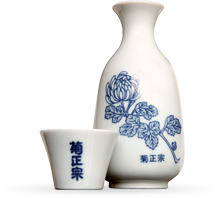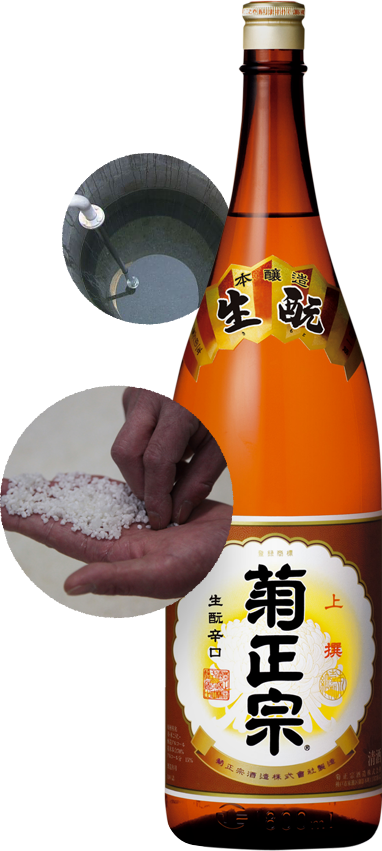
This is the most authentic and abidingly popular variety of Japanese sake, one that complements the flavor of Japanese cuisine and one that you will never tire of drinking.
Kiku-Masamune's dedication to dryness is explained by the fact that dry sake is ideal as an accompaniment for cuisine, whose flavor it enhances. Not only does Japanese sake play a supporting role for Japan's rich culinary culture, but it also is attracting attention worldwide in connection with the booming popularity of Japanese foods such as sushi. Kiku-Masamune will continue to pursue the ideal of authentic dry sake with a refreshing flavor that is free of impurities and a crisp, clean finish that perfectly complements all styles of cuisine.

As they say, the local cuisine tastes best with the local wine. Food and sake each make the other more enjoyable as they serve to anchor culinary culture. Strong-flavored Chinese rice wine complements Chinese cuisine, which features many fried dishes with intense flavors. In French cuisine, full-bodied red wines with plenty of tannins are compatible with meat dishes served with rich sauces, while fruity, acidic white wines complement fish dishes prepared with citrus or herbal seasonings. With Japanese sake, the sweetness of the sake itself, which remains as an aftertaste, can interfere with some types of cuisine. By contrast, smooth, dry sakes that lack both intense flavor and the aftertaste of lingering sweetness so that you never tire of drinking them not only preserve the flavor of the cuisine, but indeed whet your appetite for it. Kiku-Masamune strives to craft exactly this type of authentic dry sake, which complements cuisine and stimulates the appetite. This type of sake brings out the distinctive flavor of delicate Japanese cuisine so that you can enjoy the natural, unadulterated taste of each ingredient in dishes such as soba, sashimi, and sushi. It is for this reason that Kiku-Masamune is loved as an accompaniment for cuisine.
but indeed whet your appetite for it. Kiku-Masamune strives to craft exactly this type of authentic dry sake, which complements cuisine and stimulates the appetite. This type of sake brings out the distinctive flavor of delicate Japanese cuisine so that you can enjoy the natural, unadulterated taste of each ingredient in dishes such as soba, sashimi, and sushi. It is for this reason that Kiku-Masamune is loved as an accompaniment for cuisine.
In this age of ever-diversifying choices, the number of sakes available to consumers is also increasing.
Yet Kiku-Masamune has consistently held fast to its pursuit of authenticity despite the fads of the moment.
We have been able to do so because we believe that consumers will never tire of drinking authentic Japanese sake. And we believe that crisp, dry sake provides precisely this type of timeless authenticity. Crisp, dry sake is free of any lingering sweet aftertaste so that the flavor of the cuisine is not lost. Many Japanese dishes feature delicate flavors derived from the unadorned taste of natural ingredients, requiring a sake lacking in intense flavors of its own (so that drinkers will not tire of it) to complement them in the manner of high-quality water. Only dry Japanese sake can play this role.
Customers worldwide have chosen the smooth, dry sakes that we produce based on these beliefs.
In a recent survey of 500 liquor stores in Tokyo asking which label has the highest sales for commercial and corporate customers, more stores chose Kiku-Masamune than any other brand, cementing Kiku-Masamune's status as the No. 1 overall sake over the 27-year period from 1984 to 2011. A similar survey of 300 liquor stores in Osaka Prefecture yielded the same No. 1 ranking. (These surveys were conducted by the Brewing Industry Newspaper .) There's a reason that customers choose Kiku-Masamune.
And Kiku-Masamune intends to respect the reasoning behind that preference.
People say that the process of making sake starts with growing rice, and indeed, rice has a profound effect on the flavor of sake.
Kiku-Masamune has long used only Yamada-nishiki brewer's rice as the most basic ingredient for its sake, the result of a stubborn dedication to exceptional quality. Yamada-nishiki is a type of sake rice, or shinpaku-mai, that is characterized by a larger grain size than normal rice varieties, low protein content, and a soft consistency that allows the yeast to more easily penetrate the rice. Furthermore, this variety's thin surface layer of bran, which makes it easy to absorb and digest but hard to husk during the milling process , is ideally suited for use as sake rice. Most labels winning the Gold Prize in the National New Sake Awards are made with Yamada-nishiki rice.
Authentic dry sake is the essence of Kiku-Masamune's approach. It would be impossible to bring about the refreshing, robust flavor of this sake without the mystical flavor of Miyamizu water. Water used to brew sake must be not only free of turbidity and contamination so that it tastes delicious, but also extremely low in iron, which can compromise the color and flavor of the sake. Miyamizu water contains almost no iron yet is rich in minerals such as calcium, potassium, magnesium, and phosphorus. This mineral content provides nutrition for the yeast as well as a variety of other microbes, driving a healthy, robust fermentation process to create refreshingly dry sake as only a brewing process charged with hard water can. Once fresh sake brewed using Miyamizu water matures over the summer, it takes on a "well-rounded" character in terms of both aroma and flavor come autumn, dramatically enhancing its quality. Such sakes are known as akibare or akibae since they mature in the fall, and these expressions have become synonymous with delicious sake.
